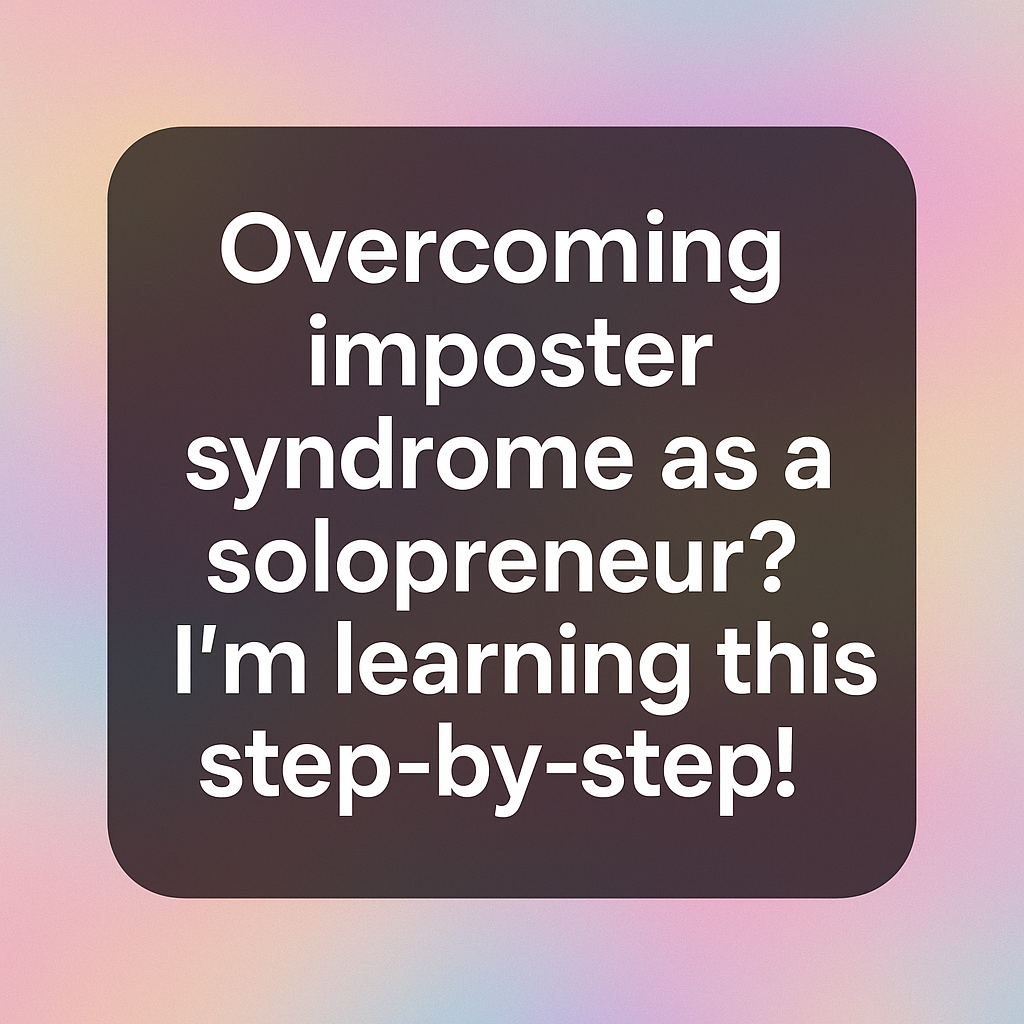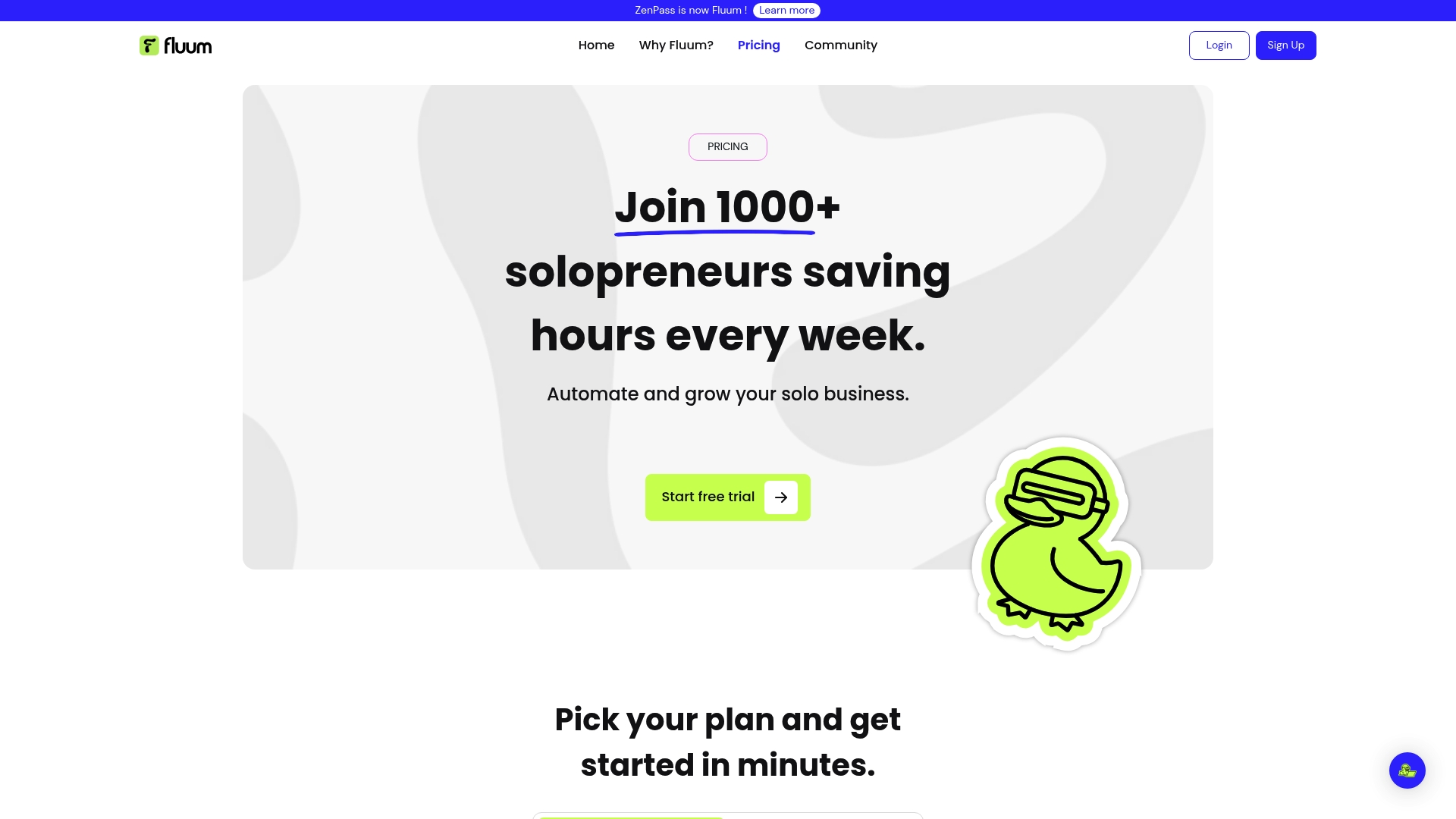
Imposter syndrome can hit solopreneurs the hardest. Even the most successful solo professionals face an uncomfortable secret: about 70 percent of people struggle with imposter syndrome at some point in their careers. That means nearly everyone around you may feel like a fraud too, even when they appear confident. Turns out, those private struggles are more normal—and far more common—than anyone ever admits.
Table of Contents
- Understand Imposter Syndrome
- Recognize Your Achievements
- Challenge Negative Thoughts
- Share Your Feelings
- Set Realistic Goals
- Seek Mentorship And Support
- Practice Self-Compassion
Quick Summary
| Takeaway | Explanation |
|---|---|
| Recognize imposter syndrome’s presence | Understanding imposter syndrome is the first step to overcoming it and building professional confidence. |
| Document achievements consistently | Track all professional milestones to create a tangible record that counters self-doubt effectively. |
| Challenge negative thoughts actively | Use cognitive reframing techniques to replace harmful self-assessments with evidence-based perspectives. |
| Share feelings with trusted peers | Discussing insecurities fosters support and reduces the isolation often caused by imposter syndrome. |
| Set realistic, achievable goals | Break down larger objectives into smaller milestones to create a structured path for professional development. |
1: Understand Imposter Syndrome
Imposter syndrome is a psychological pattern where professionals doubt their accomplishments and harbor persistent internalized fears of being exposed as a fraud. For solopreneurs, this phenomenon can be particularly challenging, creating significant mental barriers that obstruct professional growth and confidence.
As research from Harvard Business Review indicates, imposter syndrome affects approximately 70% of professionals across various industries, making it a widespread experience rather than a rare occurrence. This psychological challenge manifests through consistent self-doubt and an inability to internalize personal achievements.
Solopreneurs experiencing imposter syndrome typically demonstrate specific behavioral patterns:
- Constantly questioning their skills and expertise
- Attributing success to external factors or luck
- Feeling like they do not deserve their professional achievements
- Experiencing persistent anxiety about being “found out”
The origins of imposter syndrome are complex and multifaceted. These feelings often emerge from a combination of personality traits, family dynamics, and professional environments that inadvertently reinforce negative self-perception. Learn more about imposter syndrome in business to understand its deeper psychological roots.
Recognizing imposter syndrome is the critical first step toward overcoming it. By understanding that these feelings are common and not reflective of actual competence, solopreneurs can begin developing strategies to challenge and transform their self-perception. Acknowledging the syndrome does not mean surrendering to it, but rather empowering yourself to move beyond its restrictive mental boundaries.
Professional self-awareness requires honest introspection. Solopreneurs must learn to differentiate between genuine areas for improvement and unfounded self-criticism. This distinction becomes the foundation for building sustainable professional confidence and personal growth.
2: Recognize Your Achievements
Overcoming imposter syndrome requires a deliberate and systematic approach to acknowledging personal accomplishments. Validating your professional journey is not about bragging, but about building authentic self-recognition. This process involves transforming your internal narrative from constant self-doubt to confident self-appreciation.
Research from the American Psychological Association reveals that intentional achievement tracking significantly improves professional confidence and reduces feelings of fraudulence. Solopreneurs can implement several strategic methods to recognize their genuine accomplishments:
- Document every professional milestone, regardless of perceived size
- Collect client testimonials and positive feedback
- Maintain a detailed success journal tracking project completions
- Record specific skills learned and implemented
Concrete evidence serves as a powerful antidote to imposter syndrome. By creating tangible proof of your capabilities, you build an objective record that counters negative self-perceptions. This documentation becomes a reference point during moments of self-doubt, providing empirical validation of your professional competence.
Explore our business growth guides to help you systematically track and celebrate your professional achievements. Developing a structured approach to recognizing your worth transforms abstract feelings into measurable progress.
Quantifying achievements goes beyond emotional validation. Tracking your professional growth creates a strategic roadmap for future development. This approach helps solopreneurs identify patterns of success, understand their unique strengths, and build a compelling narrative of continuous improvement.
Remember that achievements are not limited to massive breakthroughs. Small victories matter equally in your professional journey. A completed project, a new skill acquired, a satisfied client, or overcoming a challenging workflow all represent meaningful progress. Embracing these incremental successes builds a robust foundation of professional confidence and resilience.
3: Challenge Negative Thoughts
Negative thought patterns are the primary mechanism through which imposter syndrome maintains its psychological grip. Solopreneurs must develop strategic approaches to interrupt and reframe these destructive mental narratives that undermine professional confidence.
Cognitive behavioral research from Stanford University demonstrates that intentional thought challenging can significantly reduce anxiety and self-doubt. The process involves recognizing cognitive distortions and systematically replacing them with realistic, evidence-based perspectives.
Key cognitive distortions solopreneurs commonly experience include:
- Catastrophizing potential professional failures
- Minimizing personal achievements
- Overgeneralizing single setbacks as complete inadequacy
- Comparing oneself unrealistically to perceived more successful peers
Thought challenging requires a structured approach to deconstructing internal criticism. This means actively examining the evidence supporting or refuting negative self-assessments. When a critical thought emerges, solopreneurs should immediately ask: “What objective proof exists for this belief?”
Learn advanced techniques for professional mindset management to develop more resilient thinking patterns. Cognitive reframing transforms self-defeating narratives into constructive, growth-oriented perspectives.
Practical strategies for challenging negative thoughts include:
- Collecting concrete evidence contradicting self-critical beliefs
- Developing alternative, more balanced interpretations of professional experiences
- Creating a personal “success script” that highlights actual capabilities
- Practicing self-compassion during moments of perceived inadequacy
Professional growth demands emotional resilience. By systematically challenging negative thoughts, solopreneurs can dismantle the psychological barriers created by imposter syndrome. This process is not about eliminating all self-doubt but about developing a more balanced, realistic view of one’s professional capabilities.
The ultimate goal is creating a mental framework that recognizes limitations while celebrating strengths. Solopreneurs who master this skill transform potential sources of anxiety into opportunities for continuous personal and professional development.
4: Share Your Feelings
Vulnerability is not weakness, but a powerful strategy for overcoming imposter syndrome. Solopreneurs often isolate themselves, believing that sharing professional insecurities might compromise their credibility. However, open communication serves as a critical mechanism for emotional processing and professional growth.
Research from the Journal of Vocational Behavior demonstrates that professionals who articulate their self-doubts experience significant psychological relief and increased resilience. Sharing feelings transforms internal struggles from private burdens into collaborative opportunities for support and understanding.
Effective sharing requires identifying appropriate support networks:
- Trusted professional mentors
- Fellow solopreneurs experiencing similar challenges
- Professional coaching communities
- Supportive peer groups within your industry
Selecting the right audience is crucial for meaningful emotional disclosure. Not everyone will provide constructive feedback, so strategic vulnerability means choosing listeners who offer empathy and practical perspective.
Explore our community networking resources to find supportive professional connections. Connecting with individuals who understand the unique challenges of solopreneurship creates a foundation for authentic communication.
Practical approaches to sharing feelings include:
- Practicing honest, direct communication about professional uncertainties
- Framing challenges as opportunities for growth
- Listening to others’ similar experiences without judgment
- Maintaining professional boundaries while being emotionally transparent
Communication breaks the isolating cycle of imposter syndrome. When solopreneurs recognize that self-doubt is a universal experience, they reduce the power of negative internal narratives. Sharing creates connections, provides alternative perspectives, and reminds professionals that perceived inadequacies are often temporary and surmountable.
The act of speaking about imposter syndrome transforms it from a private struggle into a collective learning experience. By normalizing these feelings, solopreneurs can develop more resilient professional identities and supportive networks that foster continuous personal and business development.
5: Set Realistic Goals
Goal setting transforms imposter syndrome from an overwhelming psychological barrier into a structured pathway for professional growth. For solopreneurs, establishing realistic objectives provides a concrete framework for measuring progress and challenging self-doubt.
Research from the Academy of Management Journal demonstrates that strategic goal setting significantly improves professional self-perception and performance outcomes. Realistic goals act as psychological anchors, grounding professionals in measurable achievements rather than nebulous self-criticism.
Effective goal setting for solopreneurs requires a nuanced approach:
- Break larger objectives into smaller, manageable milestones
- Create measurable and specific targets
- Establish timeframes with built-in flexibility
- Include personal development alongside professional objectives
Distinguishing between aspirational and achievable goals is critical. Solopreneurs frequently sabotage themselves by establishing unrealistic expectations that trigger feelings of inadequacy when not immediately met. The key is creating a goal structure that challenges without overwhelming.
Discover our strategic planning resources to develop a comprehensive goal-setting methodology. Understanding the difference between stretch goals and impossible objectives prevents potential psychological setbacks.
Practical strategies for realistic goal development include:
- Conducting honest self-assessments of current capabilities
- Consulting mentors or peers for objective perspective
- Implementing incremental progression tracking
- Celebrating small victories throughout the journey
Professional growth happens through consistent, measured progress. Solopreneurs must recognize that meaningful development occurs through sustained effort, not overnight transformation. Goals should reflect individual capacity, current skills, and potential for expansion.
The most effective goals balance personal challenge with genuine achievability. By creating a goal-setting approach that acknowledges current limitations while inspiring future growth, solopreneurs can systematically dismantle imposter syndrome and build authentic professional confidence.
6: Seek Mentorship and Support
Mentorship transforms professional development from a solitary journey into a collaborative learning experience. For solopreneurs battling imposter syndrome, strategic guidance provides external perspective, validation, and actionable insights that can dramatically reshape self-perception.
Research from MIT Sloan Management Review reveals that professionals with dedicated mentors experience significantly higher career satisfaction and accelerated skill development. A mentor serves not just as an advisor, but as a critical psychological support system.
Key characteristics of effective mentorship for solopreneurs include:
- Demonstrated expertise in your specific professional domain
- Proven track record of supporting emerging professionals
- Willingness to provide candid, constructive feedback
- Shared values and professional philosophy
Identifying the right mentor requires strategic networking and genuine connection. Solopreneurs should seek relationships built on mutual respect and professional compatibility, not just hierarchical knowledge transfer.
Explore our professional networking guides to develop meaningful mentorship connections. The right mentor can provide both tactical business advice and emotional support during challenging professional transitions.
Strategies for cultivating supportive professional relationships:
- Attend industry conferences and networking events
- Engage with online professional communities
- Request informational interviews with respected professionals
- Participate in mastermind groups within your sector
Mentorship extends beyond individual relationships. Solopreneurs benefit from creating a diverse support ecosystem that includes peer networks, professional associations, and continuous learning opportunities. This multifaceted approach ensures comprehensive professional development.
Ultimately, seeking mentorship is an act of professional courage. It requires vulnerability, openness to feedback, and a commitment to personal growth. By embracing external guidance, solopreneurs can transform imposter syndrome from a limiting psychological barrier into a catalyst for unprecedented professional transformation.
7: Practice Self-Compassion
Self-compassion represents the most profound psychological antidote to imposter syndrome. For solopreneurs, transforming internal dialogue from harsh self-criticism to supportive understanding becomes a critical skill for sustainable professional resilience.
Research from the Journal of Personality and Social Psychology demonstrates that individuals practicing genuine self-compassion experience significantly reduced anxiety, enhanced emotional regulation, and greater psychological well-being. This approach shifts perspective from punitive self-judgment to constructive self-understanding.
Key components of authentic self-compassion include:
- Recognizing personal limitations without harsh criticism
- Treating yourself with the same kindness you would offer a close friend
- Understanding that imperfection is a universal human experience
- Viewing challenges as opportunities for growth
Developing self-compassion requires intentional, consistent practice. Solopreneurs must actively challenge ingrained patterns of negative self-talk and replace them with nurturing, supportive internal communication.
Discover our emotional resilience resources to develop more compassionate self-management techniques. Learning to respond to personal setbacks with understanding rather than punishment transforms professional challenges into meaningful learning experiences.
Practical strategies for cultivating self-compassion:
- Create a personal affirmation practice
- Document professional growth and learning moments
- Develop a non-negotiable self-care routine
- Interrupt negative self-talk with objective, kind responses
Compassion is not about creating artificial positivity, but developing genuine emotional intelligence. Solopreneurs who master self-compassion understand that professional growth involves continuous learning, occasional setbacks, and incremental progress.
Ultimately, self-compassion transforms imposter syndrome from a paralyzing psychological state into an opportunity for profound personal development. By treating oneself with the same empathy, understanding, and patience offered to others, solopreneurs can build sustainable professional confidence and emotional resilience.
Below is a comprehensive table summarizing the seven key steps for overcoming imposter syndrome as a solopreneur, including core actions and their primary benefits discussed throughout the article.
| Step | Core Action/Focus | Key Benefit |
|---|---|---|
| Understand Imposter Syndrome | Recognize the prevalence and psychological roots of imposter syndrome | Builds self-awareness and the foundation for confidence |
| Recognize Your Achievements | Consistently track milestones, skills, and positive feedback | Counters self-doubt with tangible evidence of success |
| Challenge Negative Thoughts | Use cognitive reframing and evidence-based thinking to combat negative self-talk | Reduces anxiety and fosters resilient, growth-oriented mindsets |
| Share Your Feelings | Communicate doubts with mentors, peers, or support groups | Breaks isolation, increases support, and normalizes professional insecurities |
| Set Realistic Goals | Develop achievable, measurable objectives with structured progression | Provides direction, fosters measurable growth, and prevents overwhelm |
| Seek Mentorship and Support | Build relationships with mentors and professional networks | Gains perspective, guidance, and external validation |
| Practice Self-Compassion | Cultivate supportive self-talk and self-kindness | Enhances resilience, emotional well-being, and sustainable professional confidence |
Unleash Your Confidence and Streamline Your Solo Business
Are you tired of juggling overwhelming tasks while struggling with persistent self-doubt? The steps you just learned about overcoming imposter syndrome—recognizing your achievements, challenging negative thoughts, setting realistic goals, and seeking the right support—are essential for solopreneurs who want to break the cycle of feeling like an imposter. You do not have to battle these challenges alone. Imagine an AI-powered business partner that automates your sales funnels, client management, booking, payments, and marketing, freeing up your time to focus on your true strengths and building your confidence with every win.

Take control of your journey today and discover how Fluum’s all-in-one platform transforms solopreneurship into a streamlined, supportive experience. Explore our business growth guides and see how real solopreneurs like you are overcoming self-doubt and achieving real progress. If you are ready to move beyond imposter syndrome and scale your service-based business with more clarity and less overwhelm, visit Fluum Pricing now to start your transformation.
Frequently Asked Questions
What is imposter syndrome and how does it affect solopreneurs?
Imposter syndrome is a psychological pattern where individuals doubt their achievements and fear being exposed as a fraud. For solopreneurs, this can create significant obstacles to professional growth and confidence, leading to persistent self-doubt and anxiety.
How can I recognize and validate my achievements as a solopreneur?
To effectively recognize your achievements, document every milestone, collect client testimonials, maintain a success journal, and record skills learned. This tangible evidence serves as a powerful antidote to imposter syndrome and helps counter negative self-perceptions.
What strategies can I use to challenge negative thoughts related to imposter syndrome?
You can challenge negative thoughts by recognizing cognitive distortions, collecting concrete evidence against self-critical beliefs, developing alternative interpretations of experiences, and practicing self-compassion. Structured approaches to deconstructing criticism are essential for building resilient thinking patterns.
Why is seeking mentorship important for overcoming imposter syndrome as a solopreneur?
Mentorship provides external validation, perspective, and actionable insights, significantly enhancing professional development. A mentor can guide you through challenges, offer constructive feedback, and create a supportive environment that helps you overcome feelings associated with imposter syndrome.
Recommended
- Fluum | What is Imposter Syndrome in Business
- Fluum | What is Solopreneur to Agency Model
- Fluum | What is Mindset Coaching Tool
- Fluum | What is Confidence for Service Providers
- Fluum | How to Write Proposals That Win Clients and Projects
- How to Grow Online Business Through Social Media Effectively – Jarrod Harman
- Five Small Business Marketing Tips That Won’t Make You Cry | Marketing Car Blog



